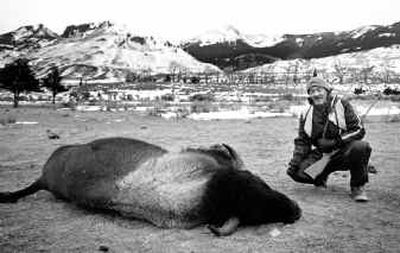Panel to consider halting bison hunt

HELENA – Montana’s wildlife commission agreed Thursday to consider canceling the state’s controversial bison hunt set to start next week, and postponed the drawing for 10 bison licenses that was scheduled for today.
The 4-1 decision was made by a commission that included three members appointed just hours earlier by new Gov. Brian Schweitzer, who said Wednesday he wanted to see the hunt canceled because of the potential for a “public relations nightmare” for the state.
The Fish, Wildlife and Parks Commission plans to meet Monday to make a decision on the fate of what would be Montana’s first hunt of bison that leave Yellowstone National Park in more than a decade.
The hunts were canceled in 1991 after a barrage of protests and negative publicity. Revival of hunting, authorized by the 2003 Legislature, was approved by the previous commission last month.
More than 8,000 people have paid $3 apiece to apply for the licenses that would be used in the monthlong season set to begin Jan. 15. A drawing that had been scheduled for Friday would determine who would get the licenses – priced at $75 for residents and $750 for out-of-staters.
Two members of the commission voiced opposition Thursday to the hunt moving forward.
Tim Mulligan, commissioner from Whitehall and the lone opponent of the hunt last month, said the plan would generate so much bad publicity for the state that it would do more harm than good in efforts to manage the bison that migrate from the park each winter in search of forage.
“There would be a firestorm that could set back the opportunity to hunt bison in Montana,” he said, echoing Schweitzer’s concerns.
Shane Colton of Billings, one of Schweitzer’s appointees, said he does not object to hunting bison as they leave the park, but “this hunt seems more symbolic than anything.”
The other new members, Steve Doherty of Great Falls and Vic Workman of Whitefish, did not state their position on a hunt. However, Schweitzer had said Wednesday he could stop the hunt by appointing people to the commission who share his view.
Commissioner John Brenden of Scobey, who voted for the hunt last month, assailed fellow members for caving in to “blackmail” from groups opposed to the hunting of Yellowstone bison, some of whom have threatened to organize a boycott of Montana if the shooting occurs.
“I don’t think that it would look good for the new governor, who touted his experiences of hunting and fishing in the press, to cave in to some fringe groups,” Brenden, a longtime Republican, said of the Democrat Schweitzer. “We will be hurt in the minds and eyes of a lot of Montana and out-of-state sportsmen.”
In an interview, Schweitzer rejected that argument, saying, “Most sports people recognize you have to have a fair-chase hunt.”
He said he wants bison to be hunted like other wildlife, after they have a greater range established on which to roam in Montana, and that could come as early as 2006.
“There will be a significant hunt,” Schweitzer said. “There’s going to be a hunt next year. I just don’t want a black-eye hunt. I don’t think we should have the equivalent of shooting refrigerators.”
Mulligan said he, too, is concerned about a repeat of confrontations between bison-protection activists and hunters in the field during the previous hunts.
“We’re not caving in to anyone,” he said. “We may be putting 10 hunters into a very difficult situation and a very public situation that then may damage our opportunity to hunt.”
The previous bison hunts were more orchestrated events in which game wardens arranged to escort a hunter to where a bison stood. This year’s hunt has been called more conventional, with hunters striking out on their own, Hagener explained.
Advocates of hunting see it as another management tool for controlling bison, many of which are infected with brucellosis. Ranchers fear the disease, which causes cows to abort, could be transmitted from bison to cattle, although there are no documented cases of that happening in the wild.
Schweitzer said Wednesday that killing 10 bison will do nothing to stem the growing Yellowstone herd, which has more than doubled to beyond 4,000 in the past six years.
Brenden said he was worried that canceling the hunt for this year could jeopardize the livestock industry. “We can’t afford to take chances … to have any more potential for entertaining brucellosis into Montana,” he said.